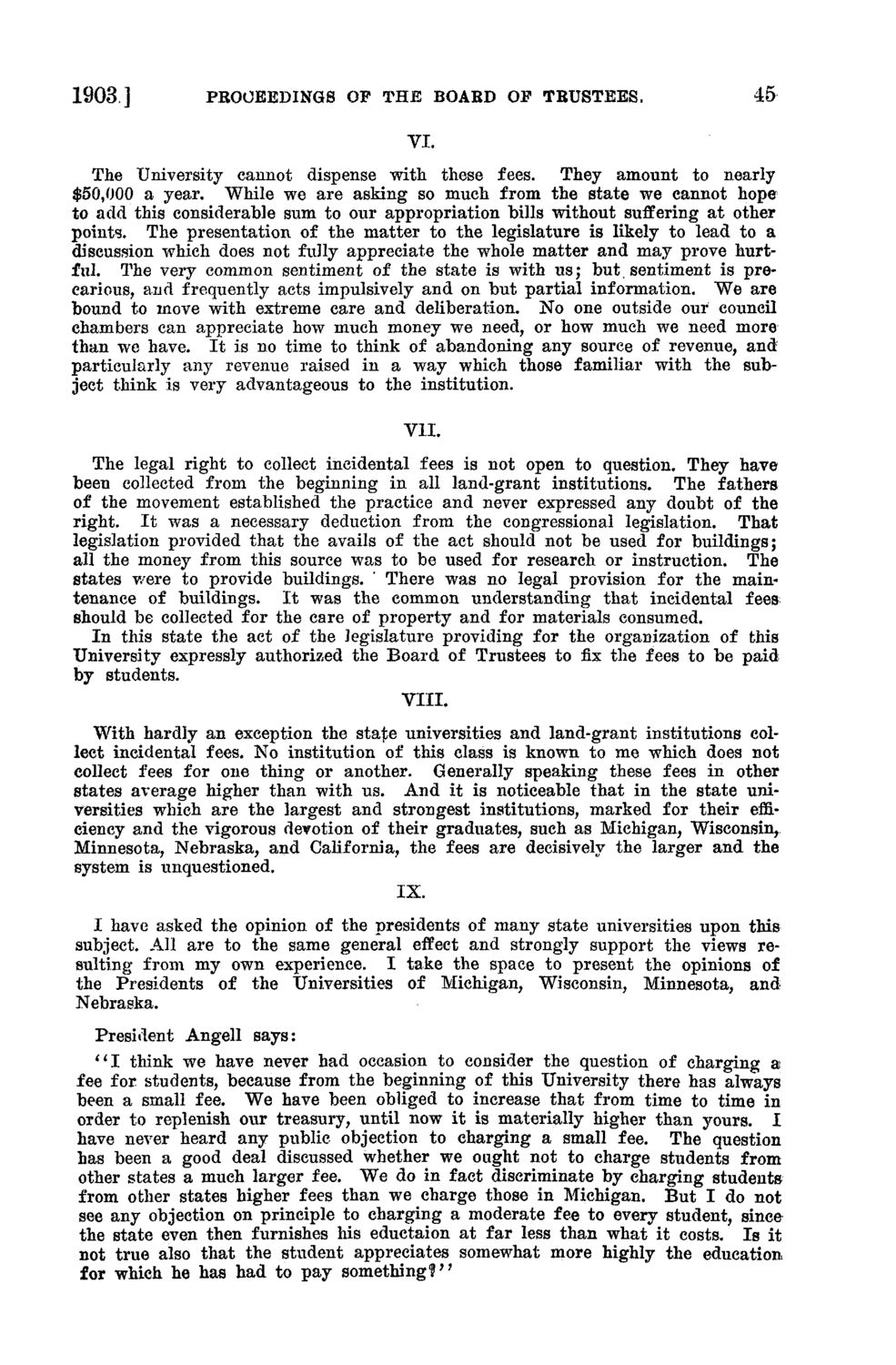| |
| |
Caption: Board of Trustees Minutes - 1904
This is a reduced-resolution page image for fast online browsing.

EXTRACTED TEXT FROM PAGE:
1903] PROCEEDINGS OF THE BOARD OP TRUSTEES. VI. 45 The University cannot dispense with these fees. They amount to nearly $50,000 a year. While we are asking so much from the state we cannot hope to add this considerable sum to our appropriation bills without suffering a t other points. The presentation of the matter to the legislature is likely to lead to a discussion which does not fully appreciate the whole matter and may prove hurtful. The very common sentiment of the state is with u s ; but. sentiment is precarious, and frequently acts impulsively and on but partial information. We are bound to move with extreme care and deliberation. No one outside our council chambers can appreciate how much money we need, or how much we need more than we have. I t is no time to think of abandoning any source of revenue, and particularly any revenue raised in a way which those familiar with the subject think is very advantageous to the institution. VII. The legal right to collect incidental fees is not open to question. They have been collected from the beginning in all land-grant institutions. The fathers of the movement established the practice and never expressed any doubt of the right. I t was a necessary deduction from the congressional legislation. That legislation provided that the avails of the act should not be used for buildings; all the money from this source was to be used for research or instruction. The states were to provide buildings. ' There was no legal provision for the maintenance of buildings. I t was the common understanding that incidental fees should be collected for the care of property and for materials consumed. I n this state the act of the legislature providing for the organization of this University expressly authorized the Board of Trustees to fix the fees to be paid by students. VIII. With hardly an exception the stajbe universities and land-grant institutions collect incidental fees. No institution of this class is known to me which does not collect fees for one thing or another. Generally speaking these fees in other states average higher than with us. And it is noticeable that in the state universities which are the largest and strongest institutions, marked for their efficiency and the vigorous devotion of their graduates, such as Michigan, Wisconsin,. Minnesota, Nebraska, and California, the fees are decisively the larger and the system is unquestioned. IX. I have asked the opinion of the presidents of many state universities upon this subject. All are to the same general effect and strongly support the views resulting from my own experience. I take the space to present the opinions of the Presidents of the Universities of Michigan, Wisconsin, Minnesota, and Nebraska. President Angell says: " I think we have never had occasion to consider the question of charging a fee for students, because from the beginning of this University there has always been a small fee. We have been obliged to increase that from time to time in order to replenish our treasury, until now it is materially higher than yours. I have never heard any public objection to charging a small fee. The question has been a good deal discussed whether we ought not to charge students from other states a much larger fee. We do in fact discriminate by charging students from other states higher fees than we charge those in Michigan. But I do not see any objection on principle to charging a moderate fee to every student, since the state even then furnishes his eductaion at far less than what it costs. I s it not true also that the student appreciates somewhat more highly the education for which he has had to pay s o m e t h i n g V
| |